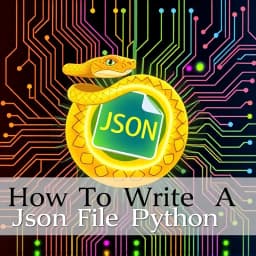
How to Write a JSON File in Python
Find this useful? Bookmark ( CTRL/CMD + D ) for quick access!
Try an example:
Basic JSON Creation
Nested JSON Structures
JSON from API Data
Dynamic JSON Generation
JSON File Manipulation
Configuration File Storage
Explore Similar Tools
Recent Generations
Taco Bar Party Ideas
the amount paid directly to you. Yes it is possible in future cases to request direct payment to the provider, Rephrase and give me polished email.
Claim Email Template
we have processed the claim as per the attachments in the claim submission we have processedthe invoice for Saul Holding. We dont have invoice for the Salofalk.
Claim Email Template
this additional information is very important. this adiitional information was requested by our clinical team. Without clinical review claim not be paid so please share the below additional information
How To Write A Json File In Python
How To Write A Json File In Python is a comprehensive guide designed to empower developers with the knowledge and skills to efficiently create and manipulate JSON files using Python. This resource combines practical examples with clear explanations to deliver a seamless learning experience for both beginners and experienced programmers.
Key Capabilities
- Step-by-step tutorials that simplify the process of writing JSON files in Python, making it accessible for users of all skill levels.
- Code snippets and examples that demonstrate best practices, enabling users to implement JSON writing techniques effectively.
- Error handling techniques to help users troubleshoot common issues, ensuring smooth execution of their Python scripts.
- Integration tips for using JSON files with various Python libraries, enhancing the versatility of your applications.
Who It's For
Designed for Python developers, data analysts, and software engineers, this guide excels in teaching how to handle JSON data efficiently. Whether you're building web applications or working with APIs, this resource streamlines your workflow and enhances productivity.
Why Choose How To Write A Json File In Python
What sets this guide apart is its focus on practical application and real-world scenarios, making it the ideal solution for anyone looking to master JSON file handling in Python.
Ready to transform your data management skills? Start using How To Write A Json File In Python today and experience the difference in your programming projects!
Enhance Your Work with How to Write a JSON File in Python
Leverage the power of AI to streamline your tasks with our How to Write a JSON File in Python tool.
Easy JSON Creation
Quickly generate JSON files with simple Python code snippets, making data handling effortless.
User-Friendly Syntax
Learn the straightforward syntax for writing JSON in Python, ensuring clarity and ease of use.
Efficient File Management
Save and manage your JSON files seamlessly, with options for reading and writing data effectively.
How How to Write a JSON File in Python Works
Discover the simple process of using How to Write a JSON File in Python to improve your workflow:
Prepare Your Data
Organize the data you want to write into a JSON file, ensuring it's in a suitable format like a dictionary or list.
Write the JSON File
Use Python's built-in `json` module to convert your data structure into a JSON formatted string and write it to a file.
Save the File
Specify the file path and save the JSON data to a file with a `.json` extension.
Verify the Output
Open the JSON file to ensure that the data has been written correctly and is properly formatted.
Use Cases of
How to Write a JSON File in Python
Explore the various applications of How to Write a JSON File in Python in different scenarios:
Data Serialization
Use JSON files to serialize complex data structures in Python for easy storage and retrieval.
Configuration Management
Store application configuration settings in a JSON file, allowing for easy updates and environment-specific configurations.
API Response Handling
Write API responses to a JSON file for logging or further processing in Python applications.
Data Exchange Between Systems
Facilitate data exchange between different systems or services by writing and reading JSON files in Python.
Who Benefits from How to Write a JSON File in Python?
AI-Powered Efficiency
From individuals to large organizations, see who can leverage How to Write a JSON File in Python for improved productivity:
Software Developers
Learn how to efficiently create and manipulate JSON files in Python for data interchange.
Students
Understand the fundamentals of JSON and Python programming through practical examples.
Data Scientists
Utilize JSON files for data storage and retrieval in machine learning projects.
Web Developers
Integrate JSON data into web applications for dynamic content rendering.
Frequently Asked Questions
What is a JSON file and why would I want to write one in Python?
A JSON (JavaScript Object Notation) file is a lightweight data interchange format that is easy for humans to read and write, and easy for machines to parse and generate. Writing JSON files in Python is useful for data storage, configuration files, and data exchange between web applications.
How do I create a JSON file in Python?
You can create a JSON file in Python using the built-in 'json' module. First, you need to convert your data (like a dictionary or list) into a JSON string using 'json.dumps()' or directly write it to a file using 'json.dump()'.
What data types can be stored in a JSON file?
JSON supports several data types, including strings, numbers, objects (dictionaries), arrays (lists), booleans (true/false), and null. However, it does not support Python-specific data types like tuples or sets.
Can I read a JSON file in Python after writing it?
Yes, you can read a JSON file in Python using the 'json' module. Use 'json.load()' to read the file and convert it back into a Python object, such as a dictionary or list.
What should I do if my JSON file is not formatted correctly?
If your JSON file is not formatted correctly, you can use a JSON validator tool to identify errors. In Python, you can also handle exceptions using 'try' and 'except' blocks when loading the JSON file to catch and debug any issues.
































